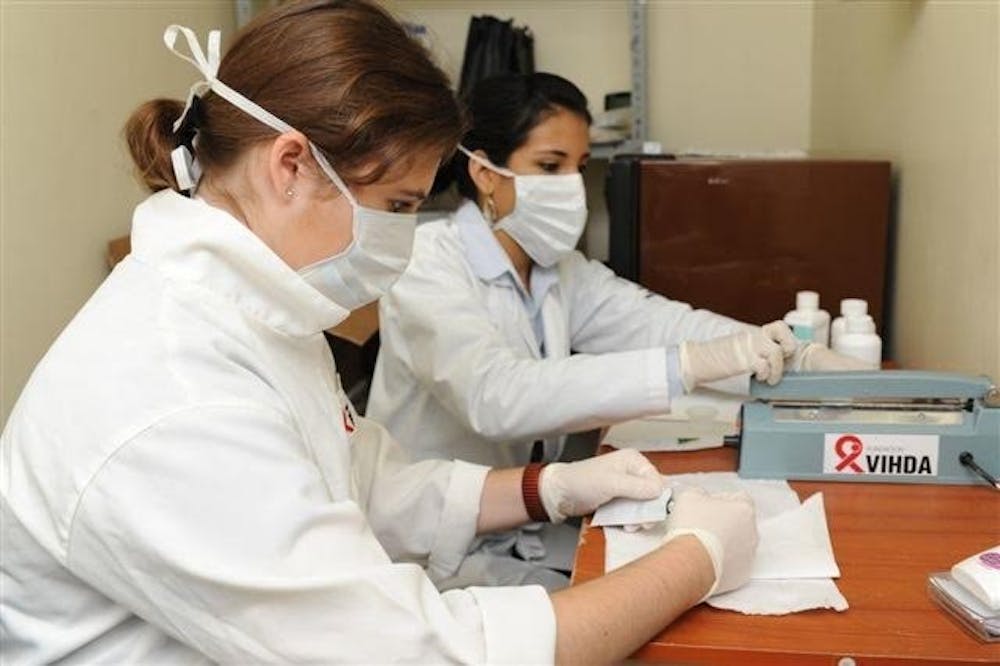Duke scientists and students are moving forward in their efforts to introduce a new method of delivering drugs that prevent the transmission of HIV from mothers to infants.
The “Pratt Pouch”—which resembles a ketchup packet—allows mothers in developing countries who cannot give birth in hospitals or clinics to administer an antiretroviral drug directly to their newborn babies. The pouch can also extend the shelf-life of the medicine by up to 12 months. After a long development process and a series of successful trials in countries including Ecuador, Tanzania and Zambia, the Pratt Pouch team is now looking for partners to introduce the pouch in more countries around the world.
Robert Malkin, professor of the practice of biomedical engineering and director of the Developing World Healthcare Technologies Lab, is leading the Pratt Pouch efforts and has been recruiting undergraduates to work on the project for seven years.
“A lot of people are talking about an AIDS-free generation,” Malkin said. “The only way to accomplish that is if HIV-positive mothers have HIV-negative children, and at the moment, the Pratt Pouch is the only solution for mothers who can’t deliver in a clinic.”
Mother-to-child transmission of HIV—which occurs during the birthing process or breastfeeding—can be prevented if an antiretroviral drug is administered within 24 hours of birth. Making sure that the mother receives medication during her pregnancy and that the infant is given it immediately after birth and for the days following can lower transmission rates to 5 percent, Malkin explained. He added that when neither of them receive antiretrovirals, it means that the baby will almost certainly become HIV-positive.
Although the HIV medication involved in previous methods of treating mothers and infants was effective, conventional delivery methods—such as syringes—often destroyed the antiretrovirals, he noted. The design of the Pratt Pouch, however, allows the surface-to-volume ratio of the packet to be adjusted so that the medicine remains in liquid form and does not dry out, which dramatically increases its shelf-life.
With the Pratt Pouch, mothers who cannot give birth in clinics can receive the medicine they need at antenatal appointments and deliver it to their infants themselves, simply by tearing the pouch open like a ketchup packet and emptying it into their mouths.
This technology has been in the works for several years, and its development process has involved a number of Duke undergraduates. The Pratt Pouch Project has involved students in every stage, from its initial design to testing, clinical research and its deployment in countries abroad.
In 2008, Malkin recruited then-senior Michael Spohn, Pratt ‘08, to begin testing hypotheses about why the antiretrovirals kept getting destroyed in their packaging.
“We found two problems: moisture loss and the drug leaching into the materials of the syringe,” Spohn explained. “So we came up with a new design to address those problems.”
In designing the new drug-delivery system, the team of both students and researchers had to conduct clinical research and determine the most cost-effective ways for pharmacists, especially in developing countries, to fill and seal the pouches. This process involved training doctors, pharmacists and community health workers to use the pouches and give mothers instructions for the medicine.
Finally, clinical trials were recently conducted in Ecuador, Tanzania and Zambia where an estimated 5,000 pouches were delivered to clinics, hospitals and mothers. Bianca Bracht, Pratt ’15, said she spent a summer in Ecuador as an undergraduate helping pharmacists fill the pouches and analyze how well the technology was working for mothers.
“It was incredible, watching her fill [the pouches] with actual medication,” Bracht said. “I got to see the first dose being given to the first newborn.”
After the trials’ success abroad, Malkin’s team is now working with implementing partners—which can take on a variety of forms, from governments to non-profits and non-governmental organizations—to distribute these pouches to more clinics and incorporate them into regional or national health care systems. However, regulations for antiretroviral distribution are different from country to country, and resources are often scarce, Bracht explained.
“But we see tremendous potential, since the majority of mothers in Tanzania and Zambia are breastfeeding and giving birth at home,” Malkin said. “For a huge swatch of the population, this holds the promise of a new AIDS-free generation.”
The Pratt Pouch team hopes to begin expanding into new countries such as Uganda and continue to research other applications of the pouch and the medicine it can hold.
Sophomore Emma LaPorte, a Pratt student currently doing research for the efforts, said that working on the Pratt Pouch Project has been an incredible experience so far.
“Realizing as a freshman undergrad that I could work on something so early that was actually helping people around the world—that’s one of the main reasons I wanted to go to Duke,” she said.
Get The Chronicle straight to your inbox
Signup for our weekly newsletter. Cancel at any time.

